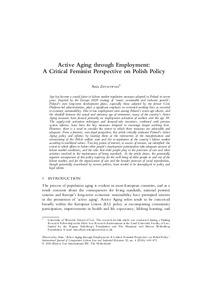Active aging through employment: a critical feminist perspective on Polish policy

The International Journal of Comparative Labour Law and Industrial Relations
2016
32
4
December
449-472
activation ; ageing ; employability ; employment ; older worker ; labour market policy
Older people
http://www.kluwerlawonline.com
English
"Age has become a crucial factor in labour market regulation measures adopted in Poland in recent years. Inspired by the Europe 2020 strategy of ‘smart, sustainable and inclusive growth', Poland's own long-term development plans, especially those adopted by the former Civic Platform-led administration, place a significant emphasis on extended working lives as essential to economic sustainability. Due to low employment rates among Poland's senior age cohorts, and the shortfall between the actual and statutory age of retirement, many of the country's Active Aging measures have focused primarily on employment activation of workers over the age 50. The supply-side activation techniques and demand-side incentives, combined with pension system reforms, have been the key measures designed to encourage longer working lives. However, there is a need to consider the extent to which these measures are achievable and adequate. From a feminist, socio-legal perspective, this article critically evaluates Poland's Active Aging policy and reforms by locating them at the intersection of the transformation and restructuring of the Polish welfare state and the re-regulation of the country's labour market according to neoliberal values. Two key points of interest, or sources of tension, are identified: the extent to which efforts to bolster older people's employment participation take adequate account of labour market conditions, and the roles that older people play in the provision of care and other activities involved in the maintenance of living standards. As the article shows, the potentially negative consequences of this policy trajectory for the well-being of older people in and out of the labour market, and for the organization of care and the broader processes of social reproduction, though potentially exacerbated by current policies, have tended to be downplayed in policy and legal reform."
Digital
The ETUI is co-funded by the European Union. Views and opinions expressed are however those of the author(s) only and do not necessarily reflect those of the European Union or the ETUI.